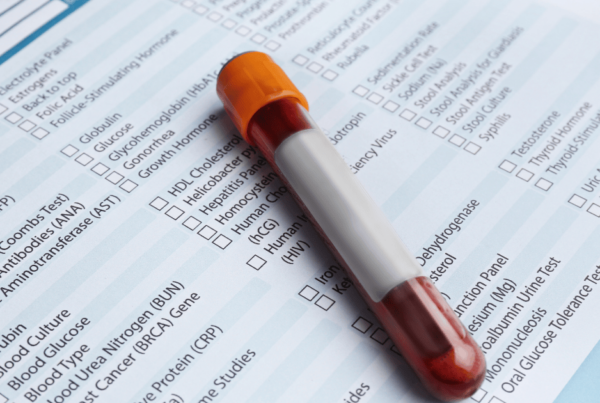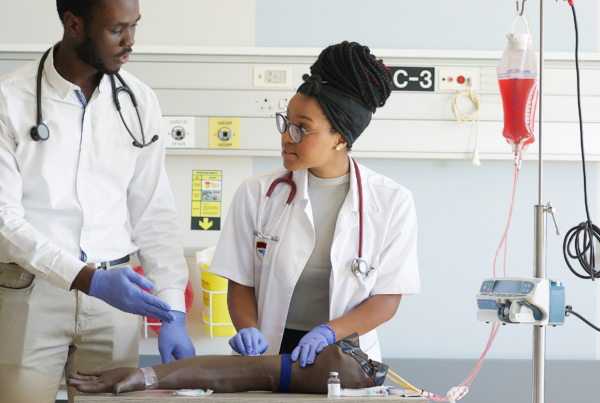Are you thinking about a rewarding healthcare job? But, are you concerned about long training or complex procedures? Phlebotomy, the art of drawing blood, could be a wonderful fit! It provides a rewarding career with short training. You are an essential part of patient care. But, before you get started, there’s one important question: is phlebotomy hard?
The answer, like a well-placed needle, is not as simple as yes or no. It depends on your abilities, learning style, and expectations. This tutorial covers the many parts of phlebotomy. It is to help you decide if it’s the right challenge for you.
| Key Takeaways |
| Skills: Dexterity, knowledge of anatomy, sterile technique. Training provides practice and builds confidence. |
| Qualities: Compassion, empathy, communication. Phlebotomists build trust with patients. |
| Knowledge: Anatomy, physiology, lab procedures, safety protocols. Lifelong learning is important. |
| Training: Takes 4-8 months, faster than other healthcare careers. |
| Challenges: Mastering technical skills, emotional intelligence, finding veins, dealing with anxious patients. |
| Rewards: Short training, good job security, career advancement opportunities. |
Is it hard? Depends on your expectations. It requires dedication, practice, and empathy.
Technical Skills: Decoding the Blood Draw Dance
The core of phlebotomy involves drawing blood. While it seems simple, it requires surprising technical finesse:
- You need dexterity and precision. Healthcare professionals need them to locate veins, guide needles, and reduce pain. This takes steady hands and a keen eye.
- Understanding Anatomy: Knowing vein location variations is crucial. They are key for successful draws. They reduce missed attempts and patient discomfort.
- Sterile Technique is key. Keeping things clean and safe prevents infections. It protects both you and your patients.
Don’t worry, aspiring phlebotomist! Rigorous training programs nurture these skills and equip you with:
- Learn the safest ways to draw blood. They cut pain and ensure good samples.
- You will get extensive practice. You will hone your skills on mannequins and under supervision. This will give you confidence before interacting with real patients.
Remember, even the most skilled professionals started somewhere. With dedication and practice, you’ll master the technical aspects of phlebotomy.
Beyond the Needle: The Emotional Intelligence of a Phlebotomist
Phlebotomy isn’t about technical skills. It’s about compassion and empathy. Patients may feel anxious or even scared during blood draws. Your ability to:
- Communicate clearly and calmly. Explain procedures and answer questions. Reduce fears with a reassuring presence.
- Empathize with their discomfort. Acknowledge and ease their anxiety. This will reduce stress and create a positive experience.
- Adapt to different personalities. Tailor your approach to build trust with each patient.
Training might not teach emotional intelligence. But, it’s developed through practice and real human connection. Consider these qualities your emotional toolset. You must refine and use it in every patient encounter.
Knowledge is Power: Beyond Poking Veins

Phlebotomy Now – Is Phlebotomy Hard
A phlebotomist isn’t just a blood-drawing machine. You’ll need a solid understanding of:
- Anatomy and physiology are important to understand. They explain the value of different blood tests and potential problems.
- Lab procedures require proper labeling, handling, and moving of blood samples. This is to ensure accurate and on-time analysis.
- Safety protocols are essential. They protect you and others from bloodborne pathogens. You must follow strict guidelines and use proper equipment.
Training programs provide this foundational knowledge, but lifelong learning is key. Stay updated on best practices. Stay updated on emerging technologies. Doing so will help you remain a valuable asset in the ever-evolving healthcare field.
Phlebotomy: Beyond the Needle – Career Outlook, Day-to-Day, and You
While the focus of your phlebotomy training might be on the technical skills of drawing blood, a fulfilling career in this field goes beyond that. Let’s delve into some factors to consider as you embark on this path:
Salary and Work Environment:
- Salary: According to Indeed: URL indeed com phlebotomist salary, the national average salary for a phlebotomist in the United States is $40,520 per year. This can change according on your background, where you live, and your employer.
- Work Environment: Phlebotomists can work in a variety of settings, including hospitals, clinics, doctors’ offices, blood banks, and even research facilities. The work environment can be fast-paced and demanding, requiring you to interact with people from all walks of life.
Career Path:
Phlebotomy can be a springboard to other healthcare careers. With additional education and certifications, you could become a:
- Licensed Phlebotomy Technician: This allows you to perform additional tasks such as collecting specimens other than blood.
- Lab Technician: Assist with processing blood samples in a laboratory setting.
- Registered Nurse (RN): A degree in nursing opens doors to a wider range of healthcare opportunities.
Personality Traits for Success:
While phlebotomy doesn’t require a specific academic major, certain personality traits are beneficial for success:
- Compassion and Patience: You’ll be working with patients who may be anxious or apprehensive about needles.
- Dexterity and Attention to Detail: Drawing blood requires a steady hand and a keen eye to ensure a smooth and safe experience.
- Communication Skills: Being able to explain procedures clearly and answer questions calmly is key to building trust with patients.
- Teamwork: Phlebotomists often collaborate with nurses, doctors, and other healthcare professionals.
Stress Management:
Phlebotomy can be stressful at times. You might encounter difficult patients, demanding workloads, or challenging blood draws. Here’s how to manage stress:
- Time Management Skills: Staying organized and prioritizing tasks can help you stay calm under pressure.
- Communication: Don’t hesitate to ask for help from colleagues or supervisors when needed.
- Stress Relief Techniques: Find healthy ways to manage stress, such as exercise, relaxation techniques, or spending time with loved ones.
Day in the Life of a Phlebotomist:
A typical day for a phlebotomist can vary depending on the work setting. Here’s a general idea:
- Morning: Arrive at work, review patient charts, and prepare supplies.
- Throughout the Day: Draw blood from patients, ensuring proper labeling and handling of samples.
- Maintain Equipment: Keep work area clean and ensure equipment is sterilized.
- Document Procedures: Accurately record patient information and blood draw details.
- Evening: May involve cleaning and restocking supplies.
Remember, phlebotomy is a rewarding career that plays a vital role in the healthcare system. By understanding the salary range, work environment options, and the importance of soft skills, you can make an informed decision about this career path. With dedication and the right personality, you can navigate the challenges and find fulfillment in helping others.
Needle Know-How: Phlebotomy and Venipuncture Explained
Let’s delve deeper into the world of needles! You’ve covered the emotional side of handling anxious patients, but there are some specific terms related to the needle itself that readers might be curious about.
- Needle Sticks vs. Venipuncture:
Although both names are frequently used synonymously, there is one little distinction. A needle stick refers to any puncture with a needle, while venipuncture specifically refers to drawing blood from a vein. So, all venipunctures are needle sticks, but not all needle sticks are venipunctures (like getting a shot in your arm).
Choosing Your Phlebotomy Training Path
Great information on the training process! Here are some additional points to consider:
- Online Phlebotomy Courses: While most phlebotomy programs involve hands-on practice, there might be online options available for some of the classroom learning. This can be a good fit for people who need flexible scheduling. Be sure to check your state’s licensing requirements, though, as some areas may not accept online-only phlebotomy training.
- Prerequisites for Phlebotomy Training: Prior medical experience isn’t always required, but some programs might have prerequisites like a high school diploma, GED, or basic science courses. Check with your chosen program to see what they require.
Career Advancement Beyond the Band-Aid
The career outlook for phlebotomists is promising! You’ve mentioned LPN and RN as possibilities, but here are some other paths to explore:
- Phlebotomy Technician: This certification allows you to perform additional tasks beyond blood draws, such as collecting other specimens.
- Lab Technician: With additional education and certifications, you can work in a lab setting, processing blood samples.
- Other Healthcare Careers: Phlebotomy is a great stepping stone! The skills and knowledge you gain can be valuable in other areas of healthcare, like becoming a medical assistant or paramedic.
Not all Blood Draws are Created Equal: Phlebotomy Challenges
You’re right, emotional intelligence is key! But there are other challenges phlebotomists face:
- Working with Difficult Patients: Not everyone enjoys needles. Some patients might be especially anxious, uncooperative, or have a fear of blood. Your ability to stay calm, be patient, and communicate effectively will be crucial in these situations.
- Long Hours: While some phlebotomy positions offer standard business hours, others might require nights, weekends, or early mornings. Be prepared for flexible scheduling depending on the work environment.
Becoming a Phlebotomy Superstar: Resources at Your Fingertips
Empowering people with resources is a great way to end your blog post! Here are some helpful additions:
- Phlebotomy Certification Requirements by State: Licensing requirements can vary by state. Provide links or resources to help aspiring phlebotomists understand their state’s specific regulations.
- Phlebotomy Associations: There are national and state phlebotomy associations that offer resources, networking opportunities, and continuing education for phlebotomists. Mention some relevant associations and include links to their websites.
FAQs: Mastering the Skills for a Rewarding Phlebotomy Career
Which characteristics are most crucial for a phlebotomist to succeed?
Compassion, empathy, and good communication skills are key. So are attention to detail and a willingness to learn. These are the qualities for success in phlebotomy.
Dedication, patience, and a positive attitude are also key. They are essential for thriving in this rewarding career.
How much time is required to train as a phlebotomist?
Most phlebotomy programs take 4-8 months. They offer a faster entry into healthcare than other jobs.
Do I need to be good at science?
Basic science knowledge is helpful, but not required. Training programs give you the needed understanding of anatomy, physiology, and lab procedures.
What are the biggest challenges?
Mastering technical skills and emotional intelligence are key hurdles. Learning to find veins is hard. Drawing and calming anxious patients also need dedication and practice.
What are the job opportunities and career advancement options?
Phlebotomists work in diverse healthcare settings with good job security. Your experience can lead to other healthcare careers. These include lab technician and registered nurse. But, you need more education.
Is Phlebotomy Hard? The Balancing Act of a Rewarding Career
So, is phlebotomy hard? It depends. Expecting a walk in the park? The technical demands, emotional challenges, and learning curve might surprise you.
But, if you’re drawn to an exciting, rewarding career with short training, phlebotomy can be a great goal. It’s within reach.
Remember:
- Dedication is key. Embrace learning, practice a lot, and hone your skills with repetition and feedback.
- Empathy is your superpower. It puts patients at ease, builds trust, and creates a positive experience. It makes a real difference in their healthcare journey.
- You live by lifelong learning. You must stay updated on advancements and best practices. This will keep you relevant and valuable in healthcare.
With the right mindset, commitment, and passion, you can handle the challenges of phlebotomy. You can emerge as a skilled, caring healthcare professional.
Wondering if phlebotomy is tough? We can help!
Calling all passionate individuals dreaming of a fulfilling career in phlebotomy! Phlebotomy Now is excited to launch its comprehensive phlebotomy training program, designed to equip you with the expertise and confidence to excel in this exciting field.
Are You Prepared to Take Off?
Don’t wait! Contact Phlebotomy Now today to learn more about our phlebotomy training program and discover your full potential in the exciting field of phlebotomy!
Remember that with Phlebotomy Now, you are not only acquiring a skill, but also investing in your future.







